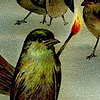Take a photo of a barcode or cover
Reviews tagging 'Death'
Pale Rider: The Spanish Flu of 1918 and How it Changed the World by Laura Spinney
5 reviews
challenging
dark
informative
reflective
sad
medium-paced
A brutally honest and unflinching look at the 1918 Influenza Pandemic. From beginning of the virus to the present it talks about how intertwined it was with WWI. An excellent, if not slightly horrifying read.
Graphic: Body horror, Death, Blood, Medical content, War, Pandemic/Epidemic
challenging
informative
slow-paced
Graphic: Death
Moderate: War
challenging
dark
emotional
informative
reflective
sad
At least 4 stars. What a fantastic book, and what an utterly surreal and slightly devastating experience to read during the third year of a respatory pandemic so soon after its publication that the author had no idea was coming. [As a type this review, Goodreads is showing me a guide to Covid-19 protective measures in lieu of a banner ad.] Aside from the poignancy, the book itself is excellent on its own merit, and I particularly like the organization. It's not easy to make an interesting story out of something so macro-scale and nebulous that there is no clear narrative or sense to it, as a pandemic is, but the author constructs the book so well by phasing between individual perspectives that reveal insights about the pandemic experience and the grand- scale impacts, including the statistics which have only become more harrowing when we compare them to the current disaster and realize we have once again been taken in the night by a pale horse and rider we will never truly outrun.
My complaints (besides my perennial unease that audiobooks make it harder to judge the reliability of sources)? The author uses "man" to mean "humanity" and refers to "he" when referring to a given doctor or flu victim, etc., both of which open the door to troubling assumptions - most but not all doctors were men in the Western world in 1918, for example, and the small but dedicated Cadre of women doctors may have had a different experience of the great flu than their colleagues (to say nothing of gendered experiences of non-Western practitioners). Chillingly, given the space devoted to eugenics and medicine in the 20th century, the text nevertheless uses Autism as an example in a list of possible genetic diseases, which is not how many Autistic people would characterize their experience and a dangerous parallel to draw, even if only included in an offhand statement about the future of medical understanding.
My complaints (besides my perennial unease that audiobooks make it harder to judge the reliability of sources)? The author uses "man" to mean "humanity" and refers to "he" when referring to a given doctor or flu victim, etc., both of which open the door to troubling assumptions - most but not all doctors were men in the Western world in 1918, for example, and the small but dedicated Cadre of women doctors may have had a different experience of the great flu than their colleagues (to say nothing of gendered experiences of non-Western practitioners). Chillingly, given the space devoted to eugenics and medicine in the 20th century, the text nevertheless uses Autism as an example in a list of possible genetic diseases, which is not how many Autistic people would characterize their experience and a dangerous parallel to draw, even if only included in an offhand statement about the future of medical understanding.
Graphic: Death, Medical content, Grief
informative
reflective
medium-paced
An interesting and thorough examination of the 1918-20 Spanish flu pandemic and the factors surrounding its emergence, spread, and aftermath, with a particularly interesting focus on ordinary lives affected as well as non-white/Christian countries and communities -- in late 2021, some passages are outright eerie (or morbidly amusing). The technical writing and style sometimes bothered me, though, as did the author's occasional tone and word choice. The last section also felt a good deal weaker than those preceding it.
Graphic: Death, Racism, Xenophobia, Medical content
Moderate: Animal death, Child death, Chronic illness, Suicide, Antisemitism, Grief, Colonisation, War
Minor: Ableism, Homophobia, Miscarriage, Rape, Forced institutionalization, Islamophobia, Cannibalism, Religious bigotry, Pregnancy
Graphic descriptions, naturally, of illnesses, deaths by illness, and epidemics/pandemics. Descriptions of unsanitary conditions and practices. Occasional discussion (negatively framed) of eugenics and forced sterilization. Dated language in some quotations and descriptions, as well as occasional kind of weird framing of Indigenous, Asian, and Black communities, traditions, and responses to racism and (attempts at) colonization.
challenging
dark
informative
medium-paced
Graphic: Body horror, Child death, Chronic illness, Confinement, Death, Terminal illness, Blood, Vomit, Medical content, Grief, Medical trauma


